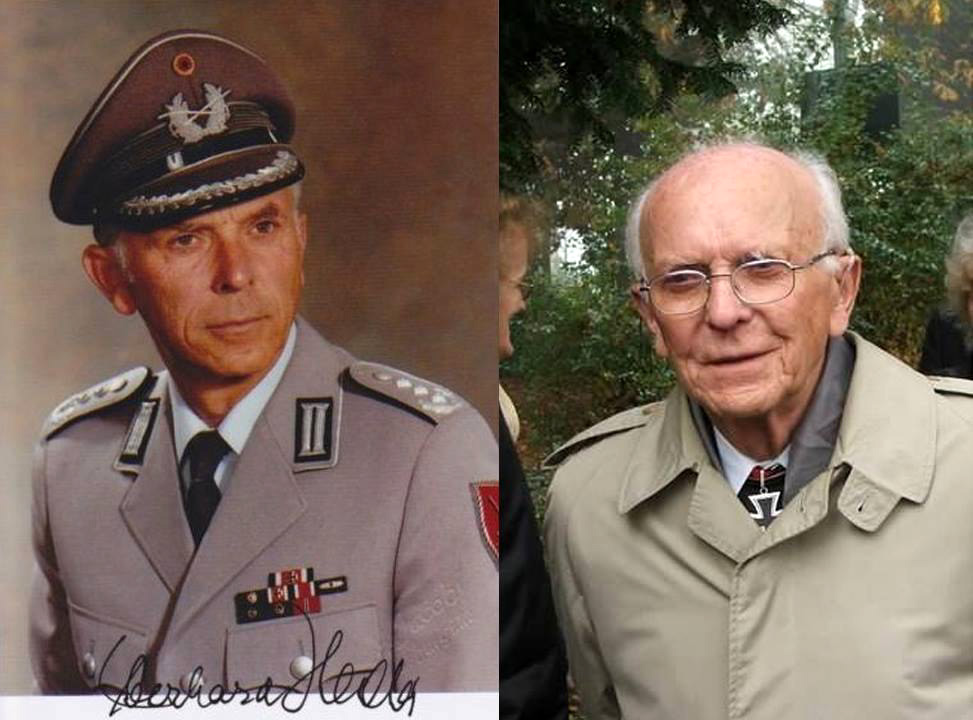
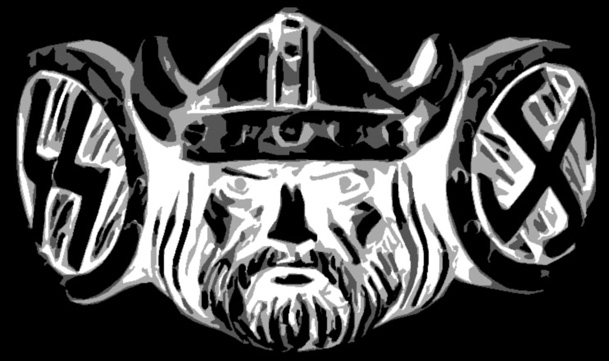
Interview Knight's Cross winner and Battalion Commander Eberhard Heder from 5. SS-Panzer Division 'Wiking', Wewelsburg Castle, 1993.
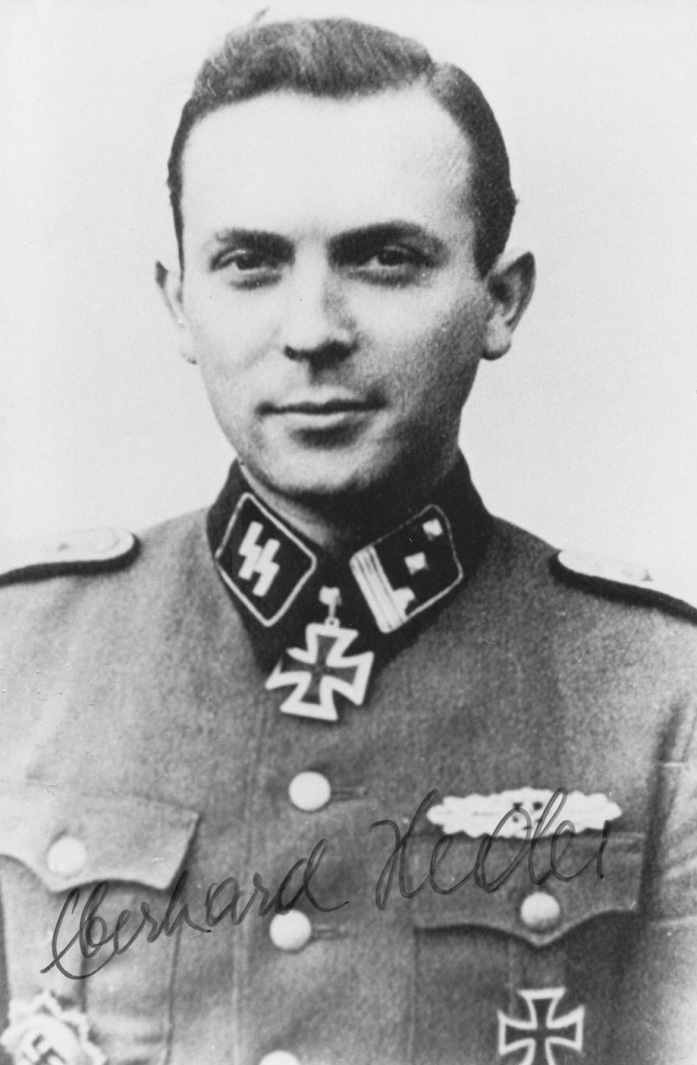


Interview Knight's Cross winner and Battalion Commander Eberhard Heder from 5. SS-Panzer Division 'Wiking', Wewelsburg Castle, 1993.

Eberhard: Yes, son, it is former however, and that is hard for me to answer you, you see. I do not know really. I would imagine it was due to the
times I grew up in. To be in the black SS back then was not anything bad; it
was looked upon as the highest level of service to the state. The SS was seen
as very elite and hard to enter.
I was not part of the party and never had anything to do with them. Who
would have thought that in 1937 the world would turn upside down in only a
few short years? I was in the Pioneers [SS-Pionier-Bataillon Dresden] with Deutschland and our barracks were
in Dresden, such a wonderful city before the bombs.
Wearing the black uniform meant prestige and opened doors for
members. Himmler really put together an organization like no other, would
you believe the SS had Jewish members as well? For all that is said, it interests
me still today that Emil Maurice was a very early founder of the Stosstrupp
Adolf Hitler ['Shock Troop' Adolf Hitler was a small, short-lived bodyguard unit set up to guard Hitler in 1923.] and friends with Hitler.
He and Himmler may not have gotten along, but he did have much
influence on things. Something I never understood was if the regime was
anti-Jewish then why did so many Jewish fellows serve in the armed forces
and government? There is something for you to think about.
Did you ever meet Hitler or Himmler?
Eberhard: Oh yes, we were in effect the bodyguards of Hitler so we would
see him at parades. The LSSAH [Leibstandarte SS Adolf Hitler] was closer to him than the rest, due to being
stationed in Berlin. Himmler we saw often, he would visit every SS unit at
least once a year to see how things were going.
We would have to line up to be inspected and to hold a parade; he
usually would attend lunch or dinner after. During the war Himmler would
come to the front often to inspect the troops. He formed the Waffen-SS and
took a vested interest in making sure all its needs were met.
He was quite a character, not the soldier type at all, he was more of
a policeman than soldier. He was very committed to the past, I remember.
When I became an officer, he spoke, telling us that, "Your destiny is protecting this holy race and to create its future, fate has called you to arms
and providence will be with you as it was with the ancestors."
It always stayed with me as he was obsessed with our past, which
was the whole reason we bore ancient Germanic and Viking symbols. This is
what this castle [Wewelsburg] was all about; he made it as a research place for the past.
When you look at everything here it was modelled on honoring Germanic
history. I must confess life was pretty good in those times; it was not so bad
to be an SS man.
Can I ask your thoughts on the war crimes accusations against the SS?
Eberhard: Oh, it is not good to speak about such things today; I certainly will
not defend everyone. I will tell you that my men were all cleared of any
claims made by the Allies. The Soviets tried to accuse Wiking of some
crimes, but they were proven false.
We fought as professional soldiers and had strict orders to treat our
enemies as combatants. I can say that we also were fair to partisans; no
mistreatment was seen by me or my officers; I can assure you of that. I would
sometimes question the enemy and can share with you an observation. They
all seemed to be told that we were criminals and killers of innocent people.
They had this in their heads, and I believe it was told to them to
make them fight even harder. The same for Wiking, we had seen that they
took no prisoners, so in a bad spot we fought like lions. I believe the political
officers told these men stories of crimes and atrocities to get them to fight
hard and with a vengeance.
Sadly, these stories had very bad consequences at war's end, many
of my men fell after surrendering. If the Soviets got you, then there was little
hope for soldiers of the SS. The Allies were much better; they understood that
we were soldiers, only doing our duty for our nation and people.
Now, I cannot say about the others, there are well-documented
trials that occurred after the war, and indeed some even happen now. You
must remember much of the Waffen-SS was made up of foreign volunteers,
so they had attitudes that brought centuries of conflicts to the front.
Some may have taken it to heart that they had scores to settle with
peoples who may have offended them. This is in no way an excuse if they
did wrong, but it helps explain some of the incidences in the Balkans, and in
France. Others I cannot even explain, shooting civilians as hostages is never
acceptable.
I must say I never saw this, but it is a claim made against the SS and
police units. That is what I hear today, the police units, which were under SS
control through Himmler, had a bad reputation with the populations. Even some Germans have come out and said the police were hard on them, so
there is no defending that. That damn war left a very bad impression on many
people.
[Above: Waffen-SS soldiers from 'Wiking' Division unleash hell unto their enemies with a MG-34 machine gun. The rifle on the back of the machine gunner's comrade is a Karabiner 98k. Somewhere in Russia. Click to enlarge.]
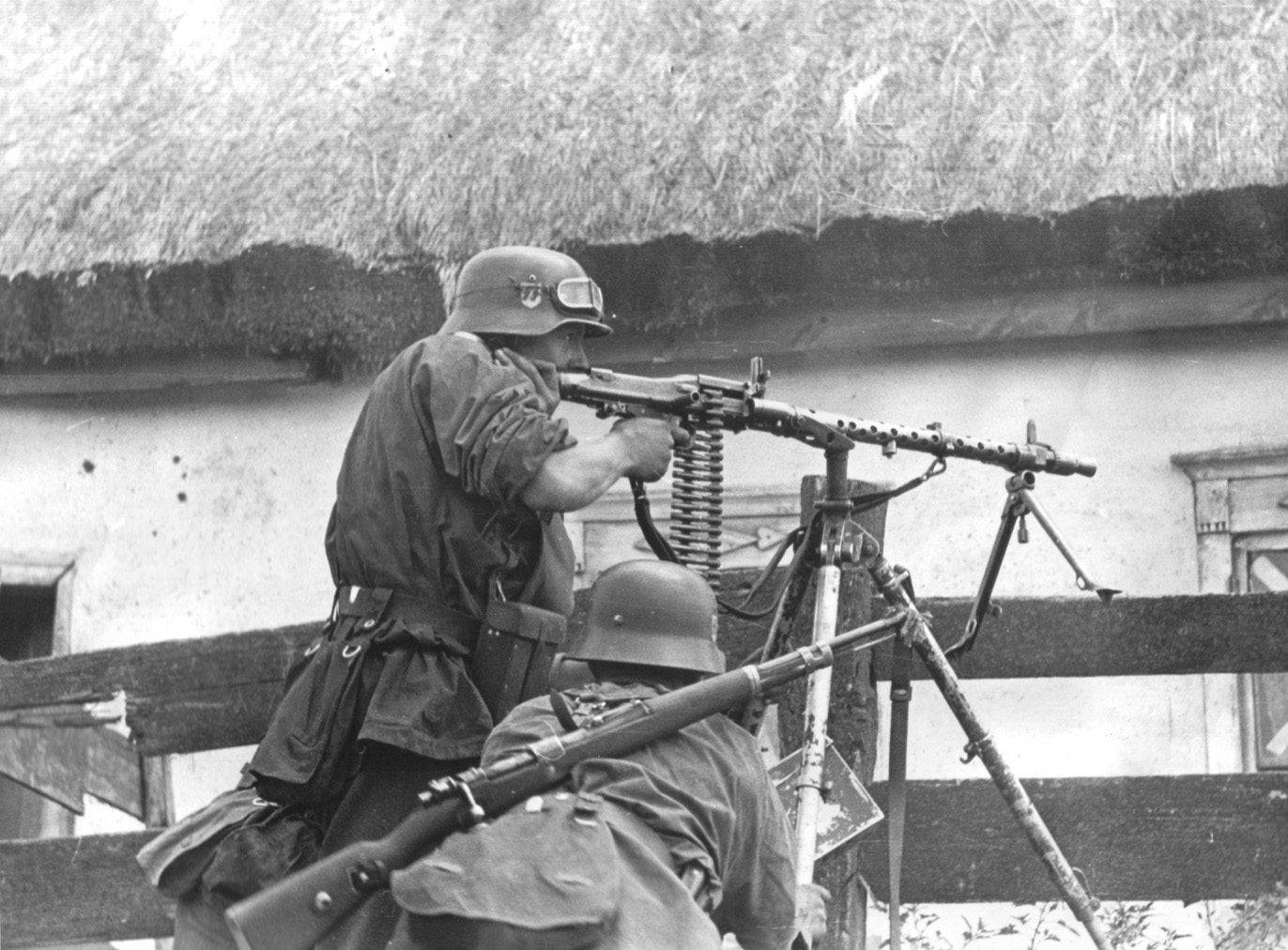
How did you feel when war was declared?
Eberhard: I was young and foolish back then; I applauded the declaration.
The reason was, many of the young had been taught that Germany received
bad treatment with Versailles. We lost a lot of land, including the people who
had lived there for hundreds of years. They became citizens of another
country over night.
We wanted revenge for that, to fix what we viewed as an injustice.
The Polish problem was the cause of it all, we were told back then that our
people who were trapped in Poland were being mistreated and abused. I did
see some refugees come over in 1938 and 1939, so perhaps there was
something to this claim.
Today of course, it is so petty to think of going to war without trying
to find solutions. War should never be the answer to a problem.
The mood was one of anxious anticipation, we were all young and
eager to get into the fight, you know we were almost afraid of missing out on
it, what buffoons we were then. Who would have thought it would have ended
so badly for us only five years later.
I understand you fought on the Eastern Front, what was the Russian soldier
like?
Eberhard: I found him to be very fierce and tenacious. They were sneaky in
that you had to watch your back; they played dead and then fired on you.
Some were not professional at all; the communist system took anyone in as
a soldier. They were mostly young peasants who had no education.
Some I noticed could not even read or write, yet they sent them to
fight the war. I say again, they had been told we were out to kill them all, so
when they surrendered, they were scared to death. I saw one shit his pants
when a gruff and tough NCO went to search him, he was rough with him.
I had to tell him to treat him as he would want them to treat him, he
just yelled back, "They would shoot me down, and you know that, and I
refuse to shoot an unarmed man Lieutenant". I had to leave that there.
They even had women serving at the front as well, a few were
snipers, and very good. We had to watch ourselves. I saw some of them once,
they had attacked a position where they misjudged the strength and were all
shot down. They were very brave and it was hard to fight them. Some men
refused to fire on them early on, and often paid for that mistake with their
lives.
Just like with dogs, they armed dogs early on with mines, and some
men could not bring themselves to shoot an animal. These dogs were trained
to go under a Panzer and blow it up. The fighting in the east was very hard,
we were outnumbered from the very beginning, and it was hard fight after
hard fight, even when Ivan retreated.
I am told you won the Knight's Cross, can I ask what happened for it to be
awarded?
Eberhard: Yes, we were in positions in a forest called Letniska [now a nature reserve in Garbatka-Letnisko, Poland], and we were
facing a vast army. They had to have a 10 or more to 1 advantage over us.
They had massed artillery, planes and armor. We had only light artillery
support and small arms with which to fight, it was uneven in the extreme.
I knew that in this pickle we had to keep up the fighting spirit, and
to give the men hope. When chances opened, I led counter-attacks to break
up enemy concentrations that were getting ready to hit us. This worked, as it
disrupted their plans and threw them into complete chaos.
We kept this up until we could be relieved and break off. Due to this
I was put up for the Cross; I already wore the German Cross in Gold. It was
a very proud moment for me, but it was bittersweet, as the war was clearly
lost, so I wondered how much more sacrifice would be made.
In the end we fought on to allow many of the refugees to escape the
Soviets, there were horrible stories being reported then. We heard of women
being raped, men shot down, even children were not spared. A man named [Ilya] Ehrenburg told the soldiers to do these things to Germans, and they did.
Do you find that serving in the Bundeswehr was anything like the Waffen-SS?
Eberhard: Heavens no, I was fortunate to be able to serve further. Most SS
men were either linked to the party, with war crimes, or fanatics. I acknowledged
the errors of the past and moved on. I only wanted to serve Germany and
nothing else.
It is testament to NATO to have welcomed Germany back into the
European family. Now that reunification happened maybe all will be
forgiven, and we move into a better future now that communism is dead. I am thankful to the friends and allies who have protected Germany from the
Soviet threat.
One last question, do you think Russia was planning to attack Germany in
1941? There was a book written that says Stalin was planning an attack and
Hitler was smart enough to beat him to it.
Eberhard: Boy, I do not know. It is possible, and I remember the vast amount
of prisoners and supplies that were taken in the beginning. Of course, Russia
would never admit it, but who knows, it is very possible that there was an
attack coming. I know Hitler was convinced of it, and that is why we went
into Russia. I have heard some comrades insist it is true, even from the
beginning, they said they saw maps of Poland and Germany on officers they
captured.
I know there were very large stockpiles of weapons, tractors, and
bridging equipment that I saw captured early on, and that is not defensive
material. Our Luftwaffe took out hundreds of planes just on the first day, so
Stalin was building his forces up on the border.
Maybe now that archives are opening up there can be more research,
I read they just found the lists of all the inmates of Auschwitz that died. I saw
that it only shows a few thousand victims instead of the 4 million claimed, so
who knows where it will go.
[Above: 1941 'Wiking' recruiting poster. It says:
[Above: Eberhard Heder while serving in the Bundeswehr (left) and proudly wearing his Knight's Cross all the long years later (right).]
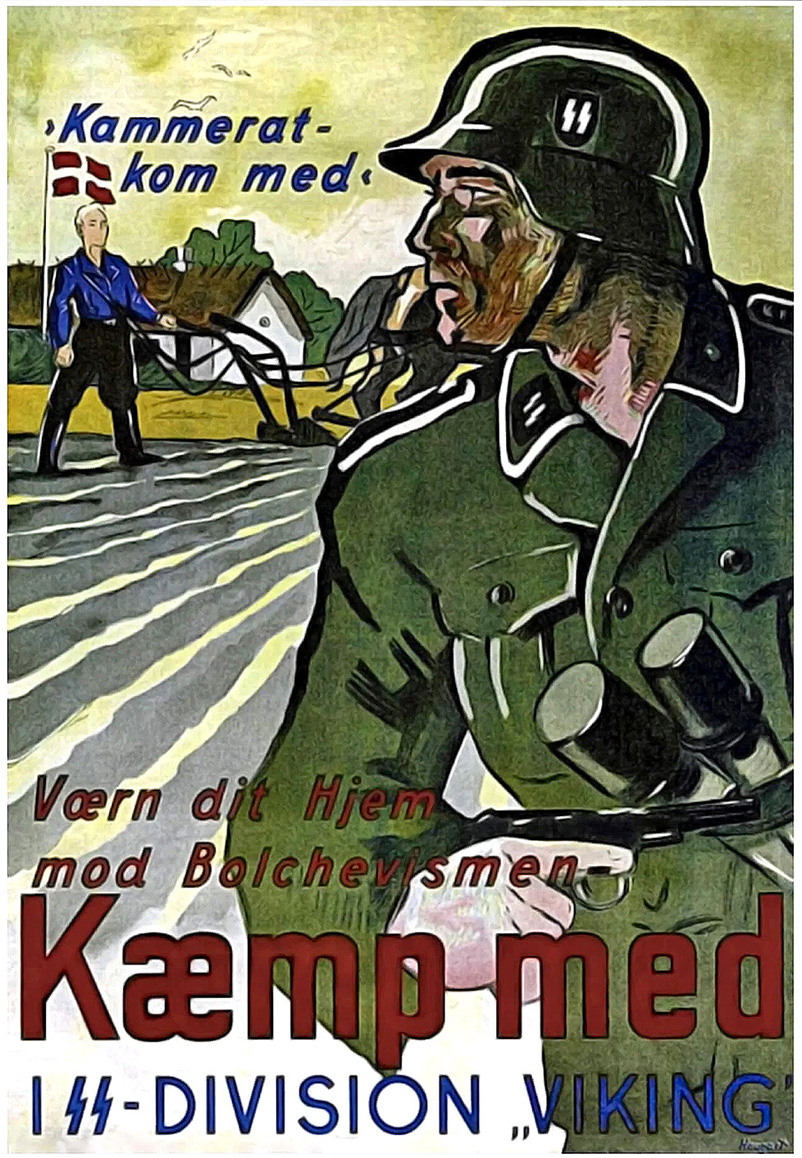
'Kammerat - kom med. Værn dit Hjem mod Bolchevismen - Kæmp med I SS-division Viking'
(Comrade - join us. Protect your home against the bolshevism - Fight with us in SS-division Viking).]
